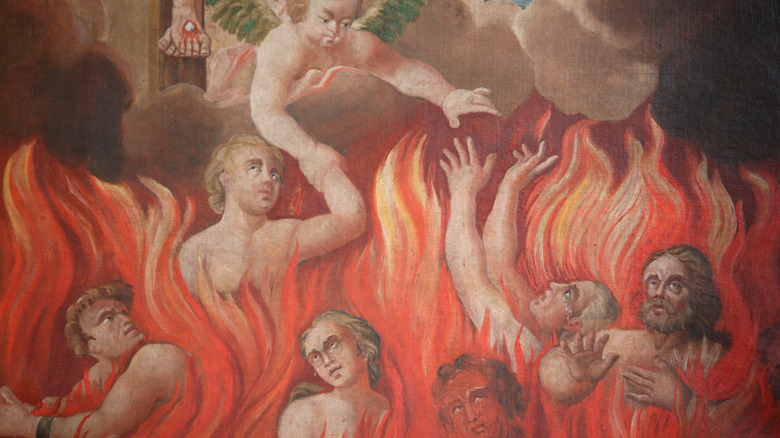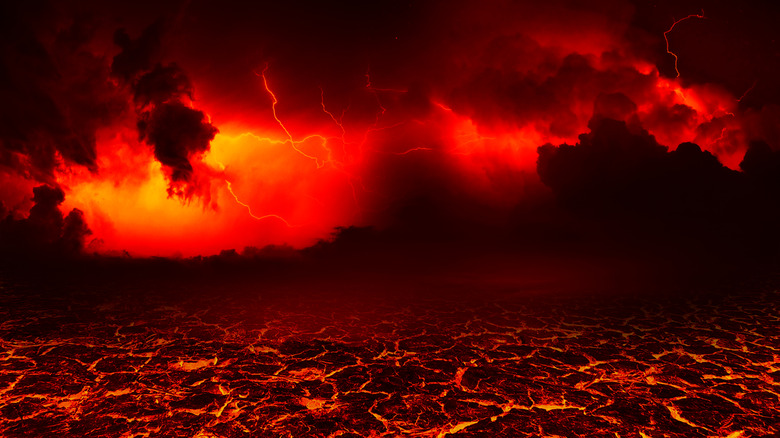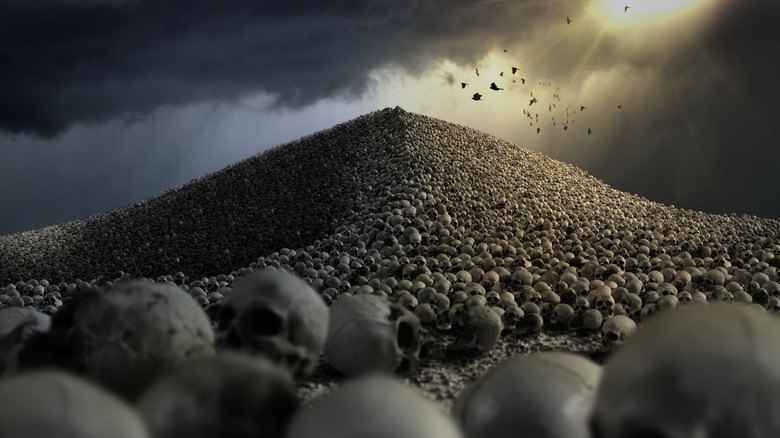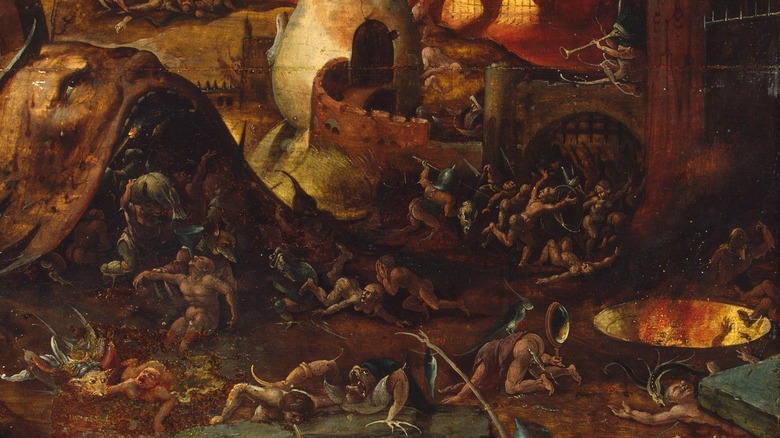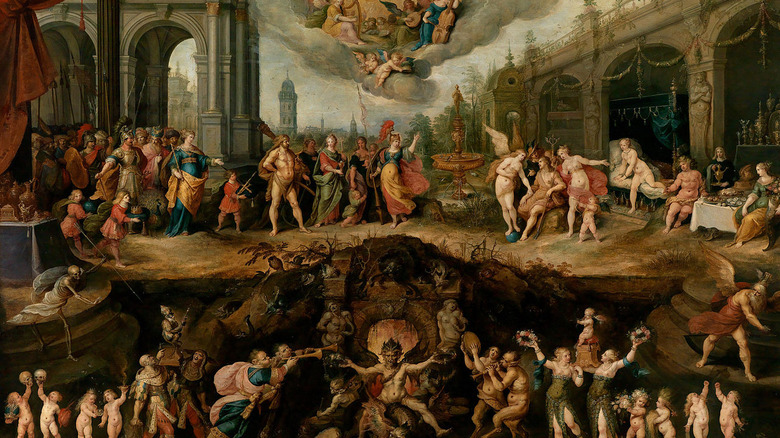The Biggest Unsolved Mysteries About Hell In The Bible
Hell: It seems like a pretty simple idea, right? Do bad stuff and you go to the bad place. Or more accurately — and a bit more theologically Christian — reject the grace of God and salvation apparent in his son, Jesus, and you wind up in the default afterlife of damnation and suffering forever and ever. Fun times. But, for such a seemingly clear concept and concrete term, Christians and non-Christians alike might be surprised to discover that there's a lot about hell that the Bible doesn't cover. Namely, anything about hell whatsoever.
See, hell doesn't exist in the Bible. "Hell" is a millennia-old aggregation of a bunch of Old and New Testament biblical concepts like Sheol, Gehenna, and the Lake of Fire mixed with Tartarus and Hades from Greek myth. All were translated in English Bibles as the name for the Old Norse underworld, "Hel." Take these terms, add some Catholic councils that solidified Christian doctrine, Dante's early-14th-century "Divine Comedy," medieval-, Renaissance-, and Enlightenment-era artwork, a whole bunch of modern pop cultural takes that get repeated and regurgitated again and again, and presto: You got your fiery pit full of horned demons with pitchforks tormenting nude bodies in a blaze.
So what mysteries of hell does the Bible actually resolve? Not many. To this day there are only extrapolations and deductions regarding what hell is, where it is (or if it's actually a state of mind), when it is (especially in relation to the Second Coming), who made it, and even who goes there.
What is Hell?
It might seem like bad logic to ask what a book says about a thing that it doesn't talk about. But in order to untangle hell as a cultural artifact, we've got to talk about what the Bible says about the concepts that became hell over time. At the same time, this is not a theological article, no matter that we've got to touch on theology.
On that note, hell's most elusive mystery remains its most basic: What is it? Is it an underground cave? Is it another "realm of existence," to frame things New Age-y? Is it a place of incorporeal consciousness that also somehow contains fire, flesh, evil entities, etc.? As far as the Bible is concerned: "Yes" to all the above.
Hell has historical roots in Sheol, best translated as "the grave" in Old Testament passages like Genesis 37 and Deuteronomy 32. Sheol was a part of ancient Jewish cosmology — a faint, dark place for the meandering dead. People died and they went into the ground, physically. That's all the Torah said about the afterlife. Over time, though, the hereafter took on intangible attributes. This is why 1 Samuel 28, for instance, talks about a medium conjuring a spirit. But not even by the New Testament does anyone mention flames devouring the unrighteous dead. At least, not until Revelation's Lake of Fire, a place where Lucifer, his fallen angels, and the unredeemed will be tossed after Jesus' Second Coming. So what is hell? It's all this all together.
Where is Hell?
The question "What is hell?" closely connects to the question "Where is hell?," as it's often envisioned as a place. That's because, as we've said, the Bible uses different words to define the afterlife, or at least the different versions of it that accumulated into "hell" over literal thousands of years. And yet, The Catholic Register notes that theologians often opt for the conclusion that Pope John Paul II reached in 1999: "Rather than a place, hell indicates the state of those who freely and definitely separate themselves from God." By "state," the pope meant "state of being," assumedly experienced by one's disembodied but self-aware consciousness — or "soul," however we define it — after death.
That being said, all of the biblical terms used to describe the afterlife position it underground. We mentioned that the Old Testament's Sheol means "the grave." Later New Testament writers borrowed Tartarus and Hades from Greek mythology because Koine Greek was their common written language, and using familiar terms helped convey new, Christian meanings. In Greek cosmology, Tartarus was the deep, dark prison pit where the titans got tossed after Zeus overthrew them. Hades was a gloomy, gray subterranean realm of spirits for dead humans. Both concepts got rolled in the Christian hell, with the former being for Lucifer and his fallen angels, and the latter for unrighteous people. Revelation 20 describes both groups getting taken from their respective places and tossed into the Lake of Fire, but says nothing about where it is.
[Featured image by Hermitage Museum via Wikimedia Commons | Cropped and scaled]
When is Hell?
Like we mentioned, New Testament writers used existing Greek terms like Tartarus and Hades to describe the afterlife, while Old Testament writers used ancient Hebrew terms like Sheol. However, because the Lake of Fire is the final resting place for all the damned — i.e., the "second death" described in Revelation 20 — every other afterlife is just a temporary waiting room. This is why if we take the Lake of Fire to be "hell," then no one is in hell. It's either hanging around now, empty and waiting for its deposit of souls in the future, or has yet to be created. But if we take "hell" to mean Tartarus, Hades, Sheol, etc., then it's the waiting room before the Lake of Fire that exists now and not in the future. Or, if we take "hell" as a general term meaning "bad afterlife place/state," then it becomes an umbrella concept signifying a removal from God's presence at any point in time after death, pre-Lake of Fire or intra-Lake of Fire.
This might sound absurdly complicated, but such complications are a consequence of two things: a) The vagueness of biblical texts regarding the afterlife, and b) Ad hoc, patchwork theological rationale based on these texts and created by early church fathers spanning through St. Augustine in the late 4th century C.E. In an historical sense, hell only started to exist when the concept solidified and people started believing in it.
Who made Hell?
And now we come to one of the more theologically sticky issues we've got to cover: Where did hell come from? Looking to a simple syllogism, if hell is a place that exists and God created all that exists, then God created hell. Or as the Bible itself says in Colossians 1, "For in him [Jesus] all things were created: things in heaven and on earth, visible and invisible, whether thrones or powers or rulers or authorities; all things have been created through him and for him." So yes, God made hell.
This is true despite how distasteful it is to imagine that an apparently all-loving deity fashioned into existence a place of undying torment. But, biblical writings have gotten around this by going back to the Tartarus/Hades distinction: 2 Peter 2 and Jude 6 say that hell — the Tartarus variety — was originally made for Lucifer and his fallen angels. It just so happens that it also makes an ideal destination for the willfully unrepentant.
That is, if we take hell to be our umbrella concept meaning, "bad afterlife place/state." Put succinctly and in a very general fashion, the much earlier-written Proverbs 16 reads, "The Lord works out everything to its proper end — even the wicked for a day of disaster." At the same time, if hell is a state of being, then we could argue God didn't "create" it — rather, people created it through their own free will, rejection of Jesus, and so forth.
Who goes to hell?
Finally, we come to the preeminent question facing those who fear eternal damnation: Who goes to hell? As always, the answer seems clear if we recite commonly-known Christian creeds such as the ultra-famous John 3:16: "For God so loved the world that he gave his one and only Son, that whoever believes in him shall not perish but have eternal life." All clear? Only if we assume what "perish," "eternal life," and even "believes" mean. Where in this recitation is hell, exactly? Or Sheol, Tartarus, Hades, or the future Lake of Fire? Remember that those places aren't hell, anyway. Hell is a confused aggregate of all of them accumulated over time.
Taking the Lake of Fire to mean "hell," different Bible verses explain who goes there. Revelation 20 and 21 don't talk about belief saving someone from the Lake of Fire, but actions. Speaking of the "book of life," the former verse says, "The dead were judged according to what they had done as recorded in the books." The latter talks about immoral acts condemning one to torment. As The Catholic Thing explains, this discussion constitutes a major divide between Catholicism and Protestantism, who split the difference on the topic by agreeing that salvation can't be earned, but with Catholicism emphasizing that good deeds kinda-sorta matter. At this point,we've already gotten sidelined from asking who goes to "hell." Sometimes the Bible says one thing, sometimes another — just like the people interpreting it.
[Featured image by Museum of Fine Arts Boston via Wikimedia Commons | Cropped and scaled]
